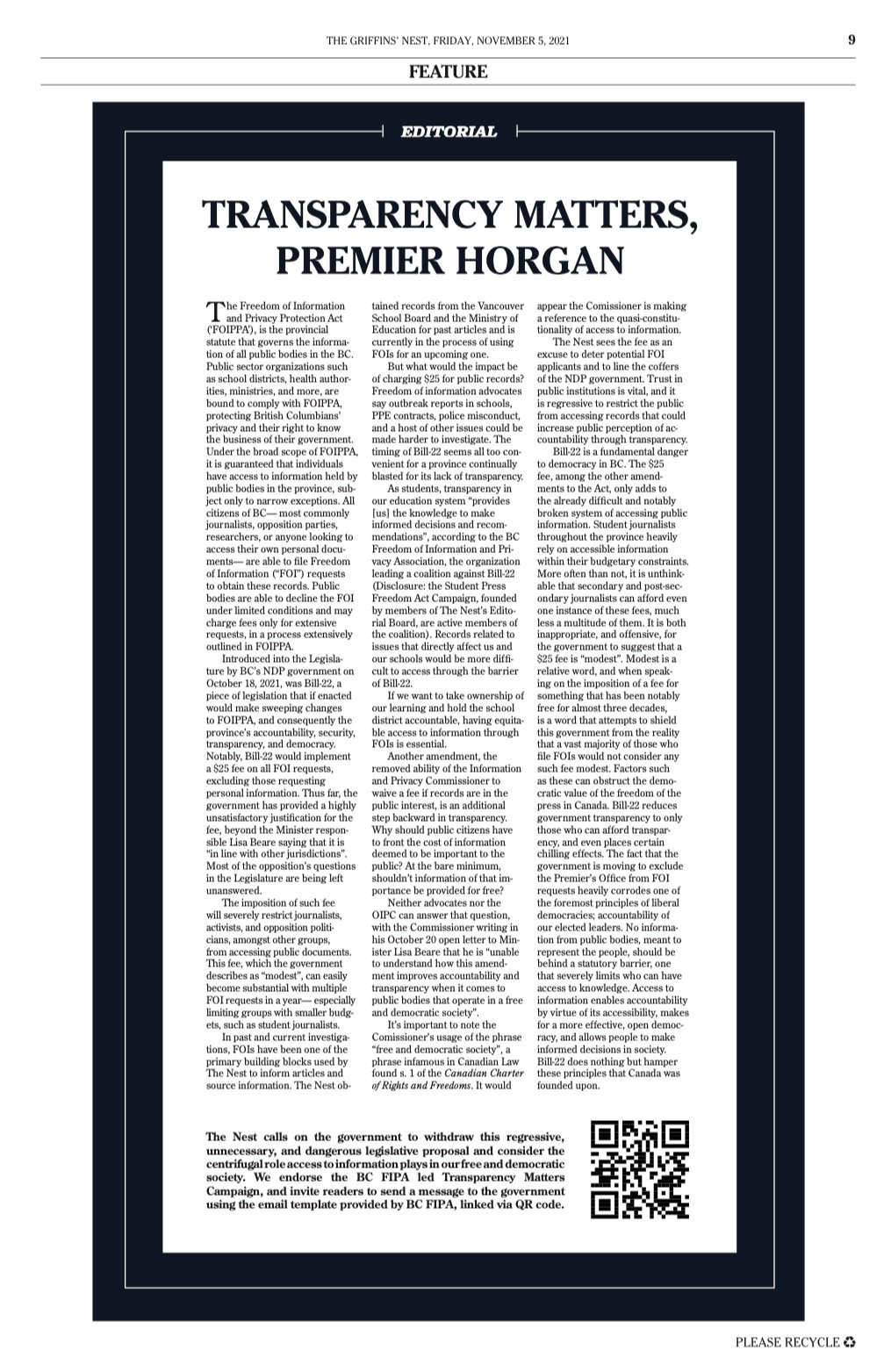EDITORIAL: Transparency Matters, Premier Horgan
The Freedom of Information and Privacy Protection Act (‘FOIPPA’), is the provincial statute that governs the information of all public bodies in the BC. Public sector organizations such as school districts, health authorities, ministries, and more, are bound to comply with FOIPPA, protecting British Columbians’ privacy and their right to know the business of their government. Under the broad scope of FOIPPA, it is guaranteed that individuals have access to information held by public bodies in the province, subject only to narrow exceptions. All citizens of BC— most commonly journalists, opposition parties, researchers, or anyone looking to access their own personal documents— are able to file Freedom of Information (“FOI”) requests to obtain these records. Public bodies are able to decline the FOI under limited conditions and may charge fees only for extensive requests, in a process extensively outlined in FOIPPA.
Introduced into the Legislature by BC’s NDP government on October 18, 2021, was Bill-22, a piece of legislation that if enacted would make sweeping changes to FOIPPA, and consequently the province’s accountability, security, transparency, and democracy. Notably, Bill-22 would implement a $25 fee on all FOI requests, excluding those requesting personal information. Thus far, the government has provided a highly unsatisfactory justification for the fee, beyond the Minister responsible Lisa Beare saying that it is “in line with other jurisdictions”. Most of the opposition’s questions in the Legislature are being left unanswered.
The imposition of such fee will severely restrict journalists, activists, and opposition politicians, amongst other groups, from accessing public documents. This fee, which the government describes as “modest”, can easily become substantial with multiple FOI requests in a year— especially limiting groups with smaller budgets, such as student journalists.
In past and current investigations, FOIs have been one of the primary building blocks used by The Nest to inform articles and source information. The Nest obtained records from the Vancouver School Board and the Ministry of Education for past articles and is currently in the process of using FOIs for an upcoming one.
But what would the impact be of charging $25 for public records? Freedom of information advocates say outbreak reports in schools, PPE contracts, police misconduct, and a host of other issues could be made harder to investigate. The timing of Bill-22 seems all too convenient for a province continually blasted for its lack of transparency.
As students, transparency in our education system “provides [us] the knowledge to make informed decisions and recommendations”, according to the BC Freedom of Information and Privacy Association, the organization leading a coalition against Bill-22 (Disclosure: the Student Press Freedom Act Campaign, founded by members of The Nest’s Editorial Board, are active members of the coalition). Records related to issues that directly affect us and our schools would be more difficult to access through the barrier of Bill-22.
If we want to take ownership of our learning and hold the school district accountable, having equitable access to information through FOIs is essential.
Another amendment, the removed ability of the Information and Privacy Commissioner to waive a fee if records are in the public interest, is an additional step backward in transparency. Why should public citizens have to front the cost of information deemed to be important to the public? At the bare minimum, shouldn’t information of that importance be provided for free?
Neither advocates nor the OIPC can answer that question, with the Commissioner writing in his October 20 open letter to Minister Lisa Beare that he is “unable to understand how this amendment improves accountability and transparency when it comes to public bodies that operate in a free and democratic society”.
It’s important to note the Comissioner’s usage of the phrase “free and democratic society”, a phrase infamous in Canadian Law found s. 1 of the Canadian Charter of Rights and Freedoms. It would appear the Comissioner is making a reference to the quasi-constitutionality of access to information.
The Nest sees the fee as an excuse to deter potential FOI applicants and to line the coffers of the NDP government. Trust in public institutions is vital, and it is regressive to restrict the public from accessing records that could increase public perception of accountability through transparency.
Bill-22 is a fundamental danger to democracy in BC. The $25 fee, among the other amendments to the Act, only adds to the already difficult and notably broken system of accessing public information. Student journalists throughout the province heavily rely on accessible information within their budgetary constraints. More often than not, it is unthinkable that secondary and post-secondary journalists can afford even one instance of these fees, much less a multitude of them. It is both inappropriate, and offensive, for the government to suggest that a $25 fee is “modest”. Modest is a relative word, and when speaking on the imposition of a fee for something that has been notably free for almost three decades, is a word that attempts to shield this government from the reality that a vast majority of those who file FOIs would not consider any such fee modest. Factors such as these can obstruct the democratic value of the freedom of the press in Canada. Bill-22 reduces government transparency to only those who can afford transparency, and even places certain chilling effects. The fact that the government is moving to exclude the Premier’s Office from FOI requests heavily corrodes one of the foremost principles of liberal democracies; accountability of our elected leaders. No information from public bodies, meant to represent the people, should be behind a statutory barrier, one that severely limits who can have access to knowledge. Access to information enables accountability by virtue of its accessibility, makes for a more effective, open democracy, and allows people to make informed decisions in society. Bill-22 does nothing but hamper these principles that Canada was founded upon.

